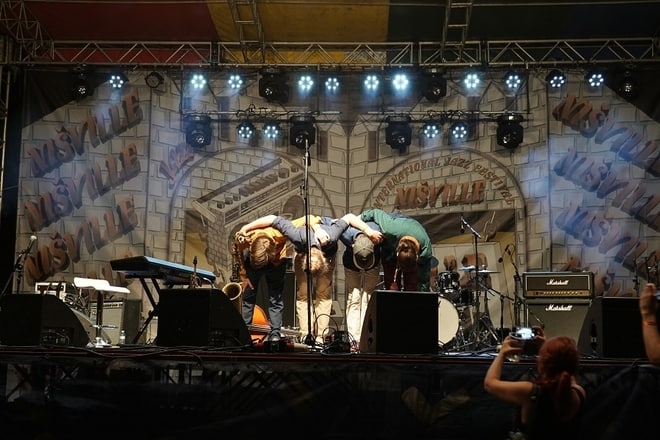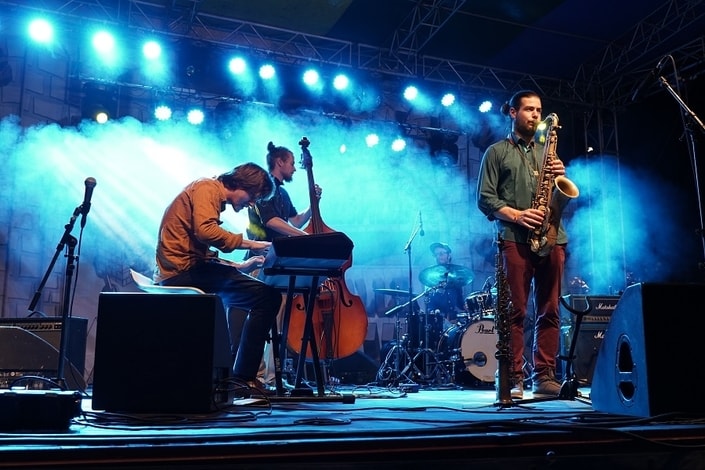What is so amazing at Nisville Jazz festival is the opportunity to “discover” some amazing new artists and bands that you didn’t have a chance to hear anywhere else before. So, Nisville Jazz festival 2019 introduced the amazing Czech-Austrian band called Purple is the Color. The band consists of Simon Raab (piano), Štěpán Flagar (sax), Martin Kocián (bass), and Michał Wierzgoń (drums).
These four extremely talented young men, their elegant and sophisticated music, and a warm atmosphere colored the Open Stage in purple, which was greatly accepted by the audience in Nis. After the show, we had a conversation with those four brilliant minds, but due to some unforeseen reasons, we couldn’t publish the interview on time, so we contacted them again and talked about some recent events as well.
Tell us about your impressions after your performance here at Nisville Jazz festival?
Michał Wierzgoń: Yeah, I really enjoyed it. I got a really cool impression of the audience. The fact that I’ve heard the music from the Main stage, I just told myself to push it, even more, to be louder, and more in it, and that actually helped me to get it to another level, so I really enjoyed it.
Martin Kocián: It was just amazing, one of our best concerts definitely! I was surrounded by the sound and by the guys that played amazing! We really felt great!
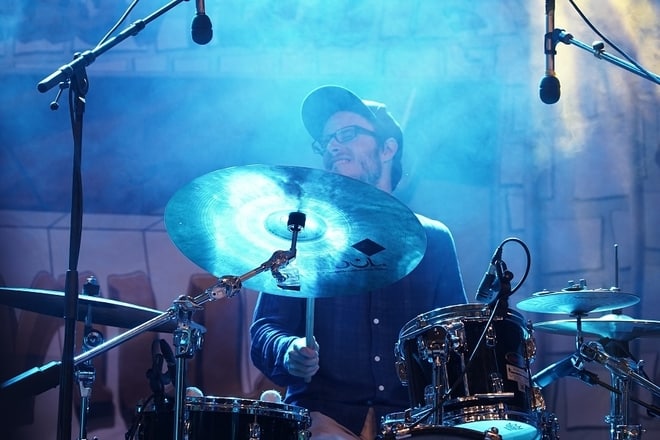
Simon, as you are the leader of the Purple is the Color, can you share with us the story behind forming this group?
Simon Raab: Actually, it was Michał who wrote me a message on Facebook, years ago, if I would like to jam with these guys. Then, we had a rehearsal, and there was a jam session in one bar in Linz (Austria), which doesn’t exist anymore, unfortunately. We all know each other from the college and we formed our band in Linz.
So, Štěpán, how do you feel when you perform, since you are the most “exposed” on the stage?
Štěpán Flagar: Performing with these three guys is just great. To be in the front, in the center of the stage, the closest to the audience – in one hand it’s very hard because you have a solo instrument and if you get that spot to play – you have to deliver something, which may create a bit of pressure, but on the other hand, I don’t get nervous about that, because we are all parts of something bigger than me. I always feel like I want to put something out, and we always support and help each other to sound better.
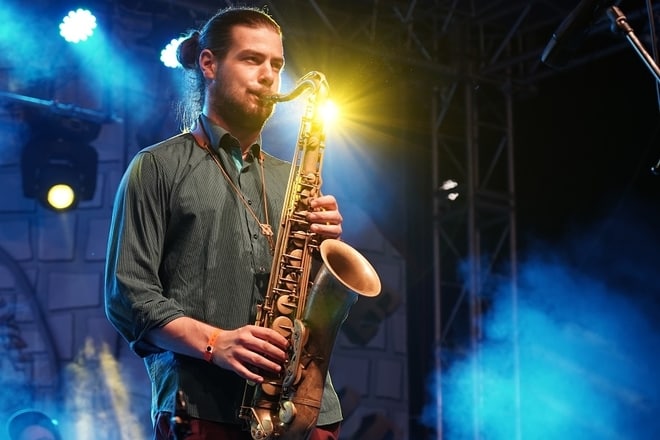
Martin, you were the most energetic on stage! You seemed to enjoy the performance even more than your bandmates. Why is that so?
Martin Kocián: Thank you, It compliments me a lot! I don’t really know if it’s (my physical performance) actually the contribution to the music and the things we do, or only to the show, I don’t know… Because the show and music are different things to me.
Guys, let’s talk about your first album. Tell us something more, please.
Martin Kocián: We published it in 2017. Most of the music on that album was composed by Simon, one piece is by Štěpán and one other by Michał.
Simon Raab: I wrote those compositions years ago, and not especially for the group. I haven’t found people who could understand music as they do, and I have to say that tonight we performed one piece, called Just kidding, but it was a totally different version. Even though we’ve been playing this music for a long time now, it’s still fresh and new at the moment, because of these guys.
There are ups and downs, there is the dynamics, and these dynamics are instant compositions, like make what you feel and the thing we are reaching now is that we feel kind of the same way in the same moment which is the highest thing you can reach as the group and this is incomparable. This is very breath-taking as well.
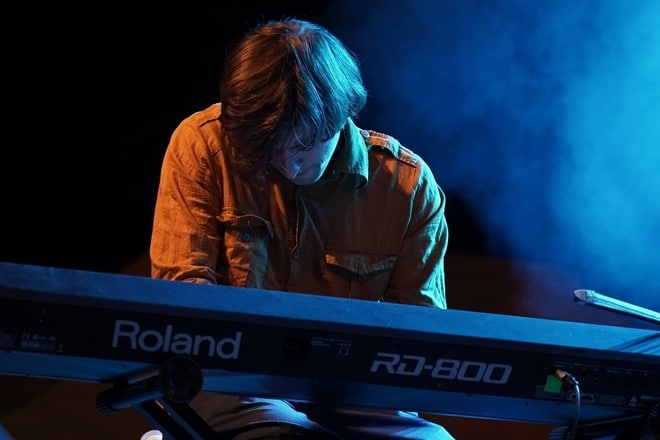
Tell me about your impressions of Serbian festivals, music, people, Serbia in general?
Michał Wierzgoń: I already knew some Serbian people from school and it was the first thing I always got from them is that the people are just really honest, really kind and somehow maybe because of that I’m from the Czech Republic so it’s kind of [our] mentality and chemistry work but this really first thing I have to say. And when we got to Niš, it really had some special vibe to it, it’s a small city but a very lively city and also the festival – it’s a jazz festival but people are here not only to listen to jazz.
They’re just here to have a party, enjoy their life and I like its mixture, it’s not like people should just go and sit there and be really serious about music, they may be both, but this is really cool idea to make. It’s still jazz: we call this band, we can watch them on YouTube, but it’s still the party which is something that Serbian people do and like to do.
What do you expect from the audience when you enter stage?
Martin Kocián: I don’t actually expect anything. If they give me to perform and do what I have to do, then I’m happy with it. And what I really like about the audience is the interaction when I know that I played something that they liked and they give the impression back that they liked it. Like, they don’t even need to clap, to shout, or something but it’s a really good audience, like here in Niš, for example, when they really feel when you do something and they like it because something’s in the air makes you feel it back. So, I don’t expect it, but I really appreciate when it comes back from the audience.
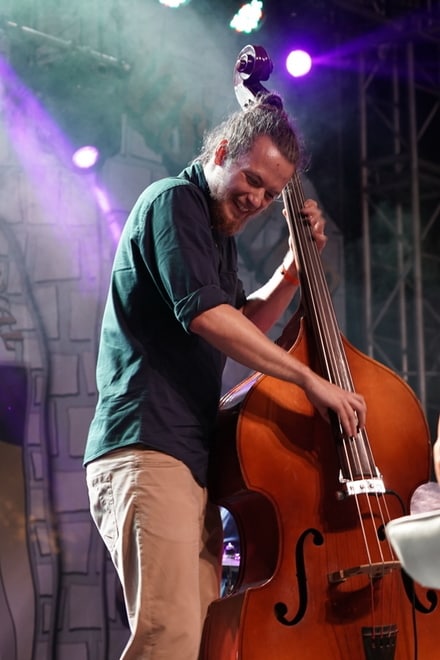
Do you guys focus on the audience like person to person or do you watch it like one whole thing and you are not focusing on faces when you perform?
Simon Raab: I never notice any specific person, maybe this is because of the position of the piano. Martin is more facing the audience and for me it is sideways. And I noticed that for me, the concert is like being in a bubble but in a good way. It’s combined focusing and closing eyes but what I always notice is if the audience is listening. This is what I get, or if the audience is not listening and this is a funny game sometimes.
Sometimes I am finding myself trying to attract the attention of the audience but when I notice that I’m doing this then I know that I’m not in music, I switch the focus. It is like when you have a conversation with somebody and you notice that the person is not looking in the eyes and you feel no respect and if you wanna say something, and as a band, we have to say music, we wanna transport something, and if we notice that it’s not responding somehow not in a way we expected then it’s kind of weird but it is different every time.
Štěpán Flagar: Sometimes, even though the audience is very loud and they respond to every single thing that you do if you feel that they are not concentrated it can be kind of disturbing. I don’t look at them in a conscious way, I don’t see anyone, even though I’m in front I don’t look at anybody, and if I do – it’s not like conscious just my eyes lend on them. I don’t focus on any specific person.
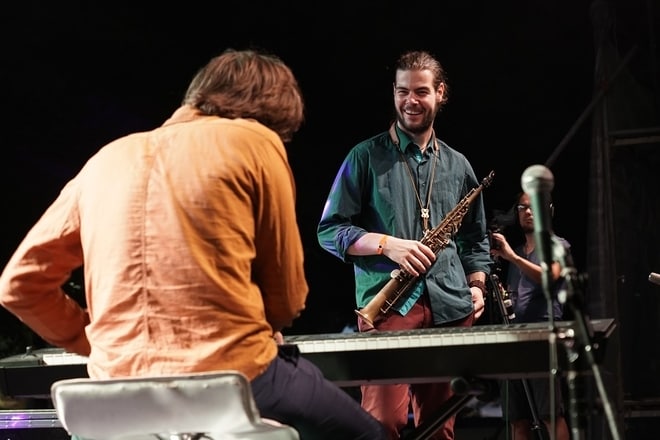
Do you want to say something or to say something that I didn’t ask you and you think it’s important for people from Serbia to know about you?
Michał Wierzgoń: We are really grateful for being invited. To be honest, I heard from our friends Radoš and Ema, who are amazing hosts, that this is going to be a nice festival, really huge and great, but it is way better than what I expected.
Martin Kocián: In my opinion, there is nothing as big as this festival in the Czech Republic or Austria. I’m speaking about jazz festivals because hearing this festival I really can feel that the jazz was given place, it’s not like we have many stages and everybody is just hanging out on random stages where is just pop music or something like that and jazz is somewhere on the 17th stage, in the forest, where you need to go 2-kilometer long walk in order to listen to jazz. So here the exposure to jazz is very cool and this is what makes me very happy. And I think I’m speaking for us all when I say that we hope that this was not the last time we got to play on this really phenomenal festival.
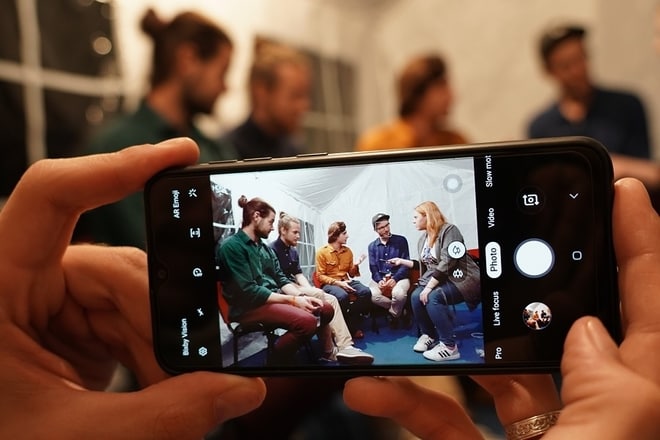
Update (Dec 2019):
You had a tour in India this autumn. How was it? What are your impressions of that country and its audience?
Simon Raab: Our Tour in India was very special in many ways… First of all, we had a very tight schedule: We had a night flight to Delhi and the day we arrived we played our first show. The concert was sold out and the people loved it! We were overwhelmed by the fact of how poor and polluted the city is, but also how friendly the people are… We played 2 more shows in the Piano Man Jazzclub in Delhi.
Then we went on the Maldives which was just crazy… That is pure luxury and quite everything is possible there. Besides all the beauty, the people we worked with were amazing to us and very supportive! We played 2 shows at the Jazzcafe in Male (the capital) and 3 shows on a different resort island – that was very beautiful.
Martin Kocián: Unfortunately, we didn’t get to see much of India. We played just concerts in Delhi and then we took our flight right onto Maldives. I was very surprised how positively people reacted to our music and how well visited the concerts were. People just loved what we did and we loved that they loved it. Speaking of my impressions in general, I’m just going to point out that I’ve never witnessed a bigger gap between poverty (Delhi) and richness (Maldives) on my own eyes. This was probably the most shocking thing for me in quite some time.
What happened after India?
Simon Raab: Right after coming home from India, we had 3 shows in Austria, later in October, we had 1 show in Bratislava and in December we had one show in Brno (CZ) and one big Festival in Vienna. After India, we went to Studio to record our 2nd album in only two and a half days. We have a producer Andreas Lettner (who is the drummer and producer of Austrian Pop Queen Lylit) – everything went very well. We did a Studio Video which will be released in January 2020 – right now everything is in the mixing process. Album will be released in the mid of April.
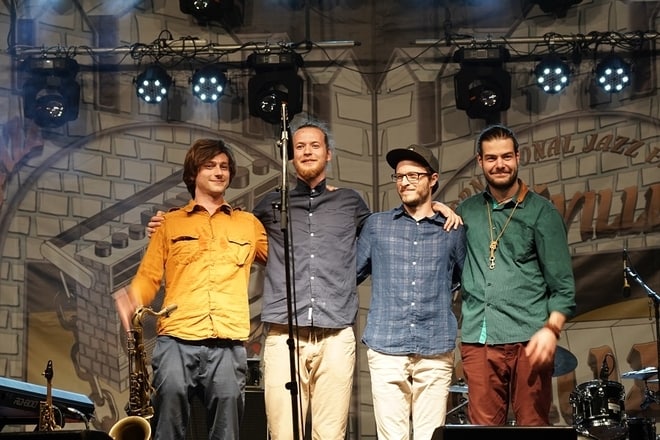
Also, you won the NASOM (New Austrian Sound of Music), which is a great privilege. How much does that mean to the Purple is the Color and – what’s next?
Simon Raab: We have quite a lot of things going on. Yes, we won the NASOM (New Austrian Sound of Music), which is a 2-year Program which will support us worldwide with financial support (Travel costs and so on). Besides that, we got the offer to play at very nice international festivals in the next years. We are all very much looking forward to the next years, which means traveling a lot with the new album. There are already plans for the next album, and there will be coming some music videos very soon.
Martin Kocián: Being granted this big privilege means a lot to us. It is definitely a big door-opener for us and our future and our plan is simply to get the most out of it! And what’s next? We’re aiming for the stars… for the stars and beyond… (laughing)
